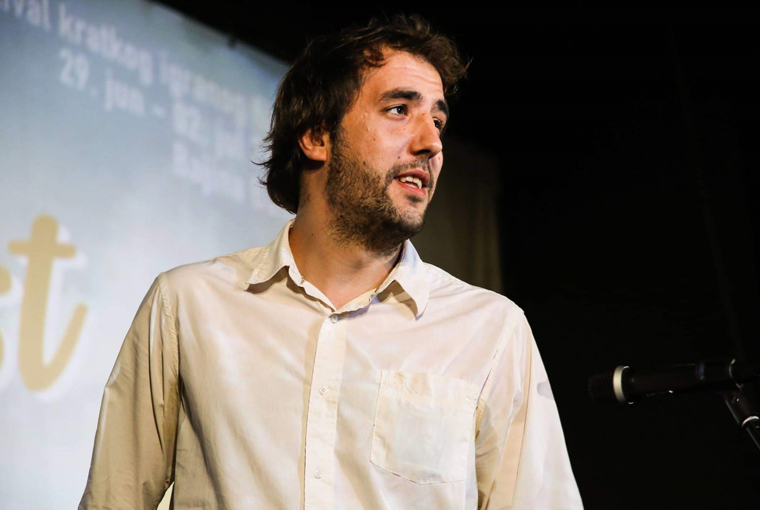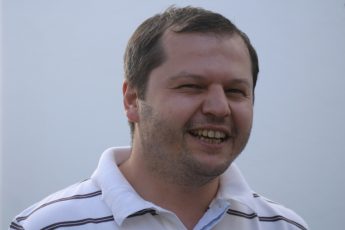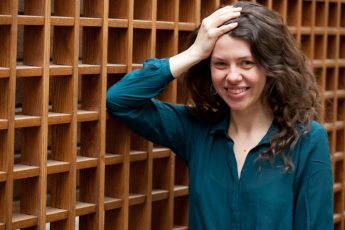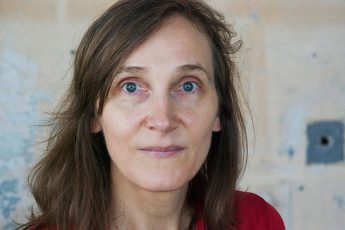
We spoke to Serbian filmmaker Marko Djordjević, whose feature debut “My Morning Laughter“ was part of the 20th goEast film festival competition, which took place online and is scheduled to be (re)screened physically during the exground film festival in Wiesbaden later this year. Djordjević speaks about the creative process, the environment depicted in his film, and his skeptical views of scriptwriting workshops.
How did you come up with the idea for My Morning Laughter?
We tried to make a feature film before this one but it was not turning out the way we wanted. So we stopped shooting, scraped all the footage and for two years I have been looking for the real reason why it did not work out as we had imagined. Eventually I realized it was because we were making a film about people who were not familiar to us and more importantly, we were not sharing their sense of humor and views on life. So, I decided to re-write the script by focusing on the lives of people in the Serbian countryside, depicting how they speak and what they speak about, what clothes they wear, where they live. One substantial thing was different: the main characters were now similar to us, I was developing the story from their perspective, so the process immediately felt more fruitful as it involved passion and authenticity.
The film location is your hometown Kragujevac, it is also the hometown of the main actor Filip Djurić. To what extent do real life and the atmosphere you are familiar with impact the film realm?
It is also the hometown of the main actress, Ivana Vuković, while the cinematographer Stefan Milosavljević is from Kruševac, a town next to Kragujevac. The point was, as your question rightly suggests, to recreate the atmosphere that we all know really well, to create a story about dying small towns in Serbia but with all the relevant nuances and details. However, it is important to note that it is more than a film that observes reality; the everyday factuality of life in provincial Serbia was just a point of departure. We tried to dig into our unconscious desires and fears and I believe this was achieved by the actors’ movements, their constant struggle with body posture. What I will say might sound like mumbo-jumbo but I believe that if you find the right words for the dialogue, choose a suitable location and finally place the camera at the accurate spot, then you can, as a director, trigger some unconscious associations within your actors, and then, at this very moment, the atmosphere in the room changes. That was what we were after: the right tone more than the right story, although we worked with a very precisely written script.
It sounds like a group of friends originating from the same environment who gather to make a film. Was it more of a collective approach?
Yes! Four of us – the two main actors, the cinematographer and myself – are like a music band. That is how we like to think about our crew. I write scenes which I discuss with them and I need their support so I can believe that what I write is worth converting into a film scene. Our producer Miloš Pušić is also a very close friend. He is a director too. We are trying to make small films without too many calculations.
How did Serbian audiences react to the film? Did people recognize themselves on screen, especially if you have shown it in your native region?
People in Serbia really liked the film. We had the best screenings in Belgrade though, the most enthusiastic ones. It was curious for audiences in the capital as they are somehow detached from the way of life in small towns depicted in the film. The premiere was fantastic – noisy and emotional, a lot of applause for the main character Dejan. I felt this special connection with the spectators, a feeling I will remember until the rest of my life. At one point during the screening I thought that as long as this kind of spiritual experience could be shared with audiences, the film itself was not important anymore as it would have accomplished its mission. It felt very much alive, more like a theater experience than cinema.
The protagonist is overprotected by his mother, which seems to be the root of his troubles. Are “mama’s boys” a typical Balkan pathology?
In my generation lots of us are mama’s boys, unfortunately. I think this happened because our parents were worried how we would fare growing up in times of war and poverty, in an ugly and hostile environment. This film is about the struggle to become a man on your own, to stop just being someone’s son.
On the other hand, being a virgin at this late age, Dejan embodies innocence and also a certain sense of romanticism. Just the opposite of the prematurely sexualized youngsters we see in Maja Miloš’s Clip, for example, who are like the products of the brutal outside reality.
Growing up in Belgrade is very different from growing up in a small town or city. I love the naïve view on life preserved there, so I develop characters with such a behavior. When they are pronouncing some romantic lines, it does not sound pathetic but rather childlike and clumsy.
In an interview in a Serbian media outlet you mention that you preferred to focus on the script instead of applying for further financing. How do you think additional funding or an eventual participation in a scriptwriting workshop would have limited your ideas?
I believe in amateurism. It is such a beautiful thing to not really know what exactly you are trying to do. I don’t find it useful to analyze my ideas with unknown people. And I do not like it when the process becomes too rational, as tends to happen in these workshops or in consultations with script doctors. I see it as a trap. When making auteur films it is important to be as close to yourself as possible, while these tutors try to teach you how to do things according to some general criteria. The conversations you have with them seem intelligent and useful on the surface, while in fact they are just banal. When you are in the position of an auteur, you have a lot of insecurities but they are really valuable. That is where the “fire” is, you do not need a script doctor to polish it so that everything gets “right”. The important experience is to reveal, even embarrass yourself, to get rid of the safety nets. Otherwise we end up watching hundreds of versions of one and the same film, very serious in tone but not in the right way. Films that do not invite you to empathize with characters and are way too cerebral. In truth, people are funnier and much more interesting than they are depicted in films. Of course, there are directors who make great films, but it is sad to see that most young filmmakers struggle so much to be “serious” and “professional”. All this makes our job more boring and creates prejudices about art films in general.
Two of the most skillful Serbian actors – Nebojša Glogovac and Jasna Djuričić – play in your film. How was the experience of working with them? Were they “loyal” to the script or did they make their own contributions? They look so natural that it is hard to believe it was all “staged”.
Everything was written and they were following it. I gave my best to persuade them to act in this small film, so my only “selling point” was the script. It is so nice to work with someone that talented, their acting looks easy and natural. I’m really grateful that they agreed to work with us.
The most memorable and hilarious episode is the visit to the fortuneteller which actually triggers the resolution of the main character’s conflict. What inspired you for this scene and this character?
In preparing for a previous film that we eventually abandoned, I went to see a local fortuneteller as part of my research. The conversation turned in a direction I hadn’t expected – he started talking about my sex life. Some things were true, some not, but the words he used, and the energy that he invested in order to persuade me that he was “seeing things”, were inspiring for me. So I wrote them down and it turned into the first elaborate scene for this film.
Another very impactful scene in my opinion is the one in the teacher’s room when an older colleague of Dejan and Kaća is speaking loudly on the phone, discussing someone’s terminal cancer. And against this backdrop Kaća is in a way declaring her interest in Dejan. I interpret it as a depiction of the sometimes intrusive familiarity so typical for the Balkan mentality, but would be curios to hear your reading and what you were seeking to achieve.
In Serbia people talk a lot about cancer. There is this common belief that because we were bombed by NATO, we now have more and more cancer cases. So, intuitively, I put that sort of talk there, in the scene when Kaća and Dejan are flirting. It just seemed right. I wanted to capture their nervousness and in the end it looks more like a battle than a flirtatious approach. Perhaps for that reason this heavy talk fits in there. I am happy you recognized it although I do not have a rational explanation why it works.
You also chose to use long shots. It appears to be a narrative tool which silently transmits the hesitation of the main character. Could you elaborate on the cinematography aesthetics in general?
It is so difficult to talk about cinematography. It somehow seemed right to use long shots, and also for us it became more risky that way. I just hope that the duration of these shots is appropriate. In most cases I believe it works well. Probably I decided on long shots because in that way one can appreciate mise-en-scène more, and all those little movements, the gestures and ticks of the actors that play a crucial role.
And how would you comment working on the final love scene, which ended up being touchingly romantic? I must admit it is hard to recall such sincerity and authenticity in a contemporary film from the region. You found the right tone and managed to show the beauty of sexual clumsiness.
We were concerned about that scene but Filip and Ivana are so talented that it turned out good. It begins with tenderness but pretty soon, because of Dejan’s fears and frustrations, one can feel his rage building up underneath. I remember watching Catherine Breillat’s Brief Crossing while preparing for the film, which depicts a shy guy who, out of his own insecurity, gets aggressive in intimate moments. That kind of aggressiveness does not last long with Dejan – he is just helpless and needs Kaća’s encouragement. This scene is similar to the opening one, when Dejan loses his mind and breaks down the glass door in order to prevent himself from punching his drunk father. And when his mother comes to calm him down, he cannot even look at her. Shyness mixed with anger and fear constitutes Dejan’s character. I want to believe in this imaginary perspective after the last shot, that Dejan will let the girl make him change for better and that he will meet some new friends or reconnect with the old ones for the sake of his socialization.
What are you working on at the moment?
I am currently writing the script for my next film, hoping that the process will help me free myself from my fears and constraints. It is about a family and their way of trying to be in good spirits at home. I am picturing it as a positive and optimistic story. Right now, I am just messing around with some words and phrases, trying to find how characters talk. I hope this will reveal to me who they are.
Sounds appealing. I wish you a fruitful creative process and thank you for this interview.
Thank you for carefully watching our film.




Leave a Comment